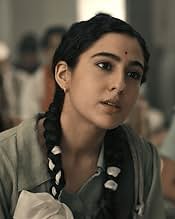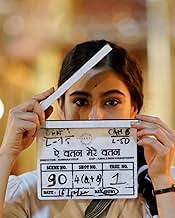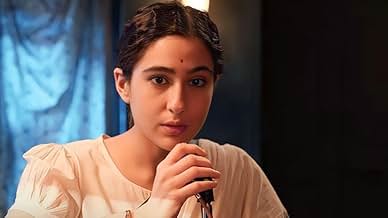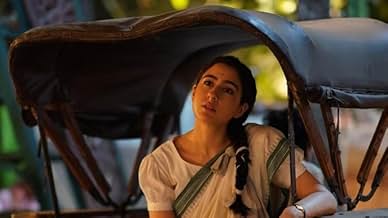Ae Watan Mere Watan
- 2024
- 2h 13m
IMDb RATING
4.7/10
1.4K
YOUR RATING
In the midst of India's struggle for freedom in 1942, a brave young girl starts an underground radio station to spread the message of unity, setting off a thrilling chase with the British au... Read allIn the midst of India's struggle for freedom in 1942, a brave young girl starts an underground radio station to spread the message of unity, setting off a thrilling chase with the British authorities during the Quit India movement.In the midst of India's struggle for freedom in 1942, a brave young girl starts an underground radio station to spread the message of unity, setting off a thrilling chase with the British authorities during the Quit India movement.
- Awards
- 1 win & 5 nominations total
Sparsh Shrivastava
- Fahad
- (as Sparsh Srivastav)
- Director
- Writers
- All cast & crew
- Production, box office & more at IMDbPro
Featured reviews
"Ae Watan Mere Watan" fails to hit the target, weighed down by Sara Ali Khan's stiff and unconvincing acting, lackluster dialogue, and missed chances to honor unsung heroes. Sara's portrayal lacks depth, leaving scenes flat and uninspired. The dialogue feels forced, failing to evoke emotion. The film fails the opportunity to shine a light on the bravery of forgotten heroes, opting instead for superficial storytelling.
The supporting cast of Emraan Hashmi, Sparsh Shrivastav, Alexx, and others fails to inject life into the narrative, leaving it flat.
Overall, it's a disappointing watch that falls short of its potential. "Nevertheless, the world needs to hear such stories"
The supporting cast of Emraan Hashmi, Sparsh Shrivastav, Alexx, and others fails to inject life into the narrative, leaving it flat.
Overall, it's a disappointing watch that falls short of its potential. "Nevertheless, the world needs to hear such stories"
First of all, BOLLYWOOD SHOULD LEARN BY NOW there Muslim card has got silent but still on
4% muslim sacrifies are shown as they were 40% part of freedom shadeds
This is a true story of Usha Mehta, who willingly scarified her freedom and went through torture from Briteshers for the sake of radio broadcast Why do you show that a person called "FAHAD" is the one who fought with Usha Mehta, in real there was no such freedom fighter, why do Bollywood always do that and not give the tribute to the one who actually deserves.
Why only you choose mosque to cast a song
Babubhai Khakar, Vithalbhai Jhaveri, and Chandrakant Jhaveri were key figures in organising Congress Radio with Usha
Even Emran Harsmi, the kissing lufanga hero is playing babu Monhoar Lhiya, any one who has read even 4 books on freedom will burn his blood to see this stupidities
Sara Ali did not justified Usha ji very well, very avg acting as if does not get into the character she needs to be Karan Johar is the producer, he better keeps his hands off from patriotist movies.
4% muslim sacrifies are shown as they were 40% part of freedom shadeds
This is a true story of Usha Mehta, who willingly scarified her freedom and went through torture from Briteshers for the sake of radio broadcast Why do you show that a person called "FAHAD" is the one who fought with Usha Mehta, in real there was no such freedom fighter, why do Bollywood always do that and not give the tribute to the one who actually deserves.
Why only you choose mosque to cast a song
Babubhai Khakar, Vithalbhai Jhaveri, and Chandrakant Jhaveri were key figures in organising Congress Radio with Usha
Even Emran Harsmi, the kissing lufanga hero is playing babu Monhoar Lhiya, any one who has read even 4 books on freedom will burn his blood to see this stupidities
Sara Ali did not justified Usha ji very well, very avg acting as if does not get into the character she needs to be Karan Johar is the producer, he better keeps his hands off from patriotist movies.
This movie is likely to be enjoyed by cinegoers who have in interest in the politics at that time. I have little knowledge of the subject to so it was hard to resonate with the story. The movie is shot in sepia and was kinda boring tbh, it took me a few times to finish watching it. Sara's gives probably her best performance to date, however there is still something lacking on screen. She doesnt emit the passion for the character/movie. Her acting is relagated to her face and it seems she puts a lot of effort to portray her emotions through. I think if she tries to act with her body then her performance will be much better.
The story itself is bold, intriguing, and offers an important glimpse into history. It's a story that should be told and brought to light.
Unfortunately, the writing and way the story was told fell flat for me. Despite the close-ups, deep glimpses into the character's eyes, and creation of atmosphere, there was only one scene that stands out to me. One were Usha hides under a burka when the police search for her and Kaushik shows her his shaking hands when she reappears. The rest of the movie felt like the same message and image on repeat: stand up for revolution and freedom. After a while, the same scene and message on repeat is just flogging a dead horse.
What I found frustrating was the message, despite coming from the right place, did not shed any new ideas or perspectives on the plight against colonialism. Instead, it amplified stereotypes. It was the stereotyping in the film and the characters that unsettled me the most. John Lyre, the British man hunting down the revolutionaries, is portrayed as ruthless, cold-hearted, and intense to the point that he feels more like a cartoon than a human man bred to view himself as superior (pure) and take pride in his country (points that could have been paralleled and contrasted with Usha's purity and pride in country, but were entirely missed). Usha, on the other hand, is portrayed as self-righteous, ego-centric (her ideas being the purest above all others'), naive about the impact she had on relationships with family and friends, and ruthless in her intensity to revolutionize India.
The most unsetting point was the way the movie glossed over radicalization. The ability to influence and spread one's beliefs (such as through a radio) comes with intense responsibility. Usha never questions once the possible myriad of outcomes that could happen... including igniting a rebellion that may fail/may lead to needless loss of lives and bloodshed. Especially since the film stated (but did not show) that she was a Gandhian.
Overall, I look forward to learning more about Usha and appreciate the movie from bringing her plight to light.
Unfortunately, the writing and way the story was told fell flat for me. Despite the close-ups, deep glimpses into the character's eyes, and creation of atmosphere, there was only one scene that stands out to me. One were Usha hides under a burka when the police search for her and Kaushik shows her his shaking hands when she reappears. The rest of the movie felt like the same message and image on repeat: stand up for revolution and freedom. After a while, the same scene and message on repeat is just flogging a dead horse.
What I found frustrating was the message, despite coming from the right place, did not shed any new ideas or perspectives on the plight against colonialism. Instead, it amplified stereotypes. It was the stereotyping in the film and the characters that unsettled me the most. John Lyre, the British man hunting down the revolutionaries, is portrayed as ruthless, cold-hearted, and intense to the point that he feels more like a cartoon than a human man bred to view himself as superior (pure) and take pride in his country (points that could have been paralleled and contrasted with Usha's purity and pride in country, but were entirely missed). Usha, on the other hand, is portrayed as self-righteous, ego-centric (her ideas being the purest above all others'), naive about the impact she had on relationships with family and friends, and ruthless in her intensity to revolutionize India.
The most unsetting point was the way the movie glossed over radicalization. The ability to influence and spread one's beliefs (such as through a radio) comes with intense responsibility. Usha never questions once the possible myriad of outcomes that could happen... including igniting a rebellion that may fail/may lead to needless loss of lives and bloodshed. Especially since the film stated (but did not show) that she was a Gandhian.
Overall, I look forward to learning more about Usha and appreciate the movie from bringing her plight to light.
Some of the movies can be avoided just by looking at the main leads. If someone like Sara Ali khan, ananya etc are in a movie as main lead, it's strict avoid. The makeup and style of Sara in this movie doesn't suit the time period. It looks more fake. And her acting is just bad. Even a child actor has more expressions than Sara.
Coming to the story it's again the usual story set during British rule. The story is slow and boring. The makers should do more research before doing such movies. Most of it looks like fiction. Need to fill some more of characters and just adding some random text here.
Coming to the story it's again the usual story set during British rule. The story is slow and boring. The makers should do more research before doing such movies. Most of it looks like fiction. Need to fill some more of characters and just adding some random text here.
Did you know
- TriviaThe protagonist of the movie "Usha Mehta" (real person) is Aunt to the famous bollywood Director Ketan Mehta
- How long is Ae Watan Mere Watan?Powered by Alexa
Details
- Release date
- Country of origin
- Language
- Also known as
- Canım Vatanım
- Production company
- See more company credits at IMDbPro
- Runtime2 hours 13 minutes
- Color
- Sound mix
- Aspect ratio
- 2.55 : 1
Contribute to this page
Suggest an edit or add missing content


































